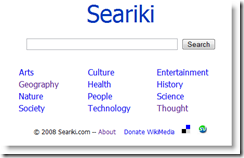Well, it’s a question. Wikis are funny things, and building communities around them can be quite tricky (although advice like this helps). More than any other types of website, wikis demand community interaction, indeed, they are nothing without it.
There are a number of different ways a wiki system can be operated. One is by using a hosted platform, where you register your wiki at a site, and they host it for you. Unless you want to spend some money, the chances are that you will have to put up with having adverts on your wiki, and you’ll be limited in how you can customise it.
On the other hand, you could register a domain (i.e. www.yourwiki.com) and install a wiki yourself. This makes you responsible for maintenance, support etc, but also means you can completely customise the wiki for your own purposes, whether in terms of style or functionality.
So, which should you choose? As so often is the case, the answer is something along the lines of ‘it depends’. However, to help you decide, here’s a number of points to consider when working out what you want to do.
1. Have you a clue about coding?
If the answer to this is ‘no’, then please get a hosted service. You don’t need to be a skilled coder, able to generate reams of perfect PHP at will, to get a wiki up and running, but it helps if you know a little bit about these things. Otherwise, you are likely to get irritated very quickly, and that’s no good at all.

2. Do your users know what they’re doing?
If your intended user base are wiki working wonks who like nothing more than to collaboratively edit websites, then you are fine with either the hosted or self-hosted option. However, if the concept of wikis is new to your users, the hosted option might be the better one. Why? Well, they tend to be easier to use. Take Wikispaces, for example, which provides an easy to use wysiwyg editor for all page edits. This is much easier than using traditional wiki markup, which many of the self-hosted options rely on, which involves putting any number of ***asterisks*** or [[square brackets]] around words.

3. Will you need heavy customisation?
If your wiki will be a collection of basic web pages, with lots of text and maybe the odd image or embedded video, then most hosted wiki options will suit you just fine. However, if you want to have different methods of entering or presenting information available – for example by using a specific form for a certain type of information – then you will probably need a self hosted wiki which you can customise to your heart’s content (though remember point 1, above).

4. Traffic
Is this going to be the wiki of the century? Are the numbers of visitors to your wiki going to eclipse even those of Wikipedia? Probably not, but if you are planning on hosting your own wiki, do bear in mind that you are likely to be responsible for paying for bandwidth, especially if your site starts to gobble a lot of it up. Generally speaking, if you have a hosted wiki, this will be the provider’s problem, not yours. This is also true about uploaded content – if you will have lots of videos on your wiki, do bear in mind that you will have to pay for storage on a self hosted wiki. With all hosted ones, you should get a certain amount of free storage.

5. Instant networks
How about attracting people to use your wiki? One of the major problems a lot of platforms suffer from is the fact that they require users to have yet another account with yet another password to remember. This will be the case with any self hosted option, unless you are very clever (see point 1 again). However, if you put a wiki on a hosted network of wikis, then there is a good chance that some of your users will already be using that network, and will therefore already have an account there. Wikispaces is a good example of this.

6. Integration
The look and feel can be an important point for many sites – what’s the point of having a stylish theme for your website if when people click to visit your wiki it looks totally different? Some hosted wiki solutions will let you pay to edit the CSS (Cascading Style Sheets – a way of setting the design elements of your website) of the site, which will allow you quite a bit of room to customise the look of your wiki. But to retheme the guts of the wiki, you’ll really need to have a self-hosted one, where the source code as well as the CSS can be altered to suit your every whim.

So, there’s plenty to be thinking about. My basic rule would be to go for a hosted solution unless there are really good reasons not to, and my personal favourite platform for this is Wikispaces. However, if you really need to go for hosting a wiki yourself, then the best in terms of features and usability for me is MediaWiki, the system which powers Wikipedia.
Below I set out some of the options available. If yoy know of ones I have missed, let me know in the comments and I will update the list.
Hosted Wikis
Self-Hosted Wikis








